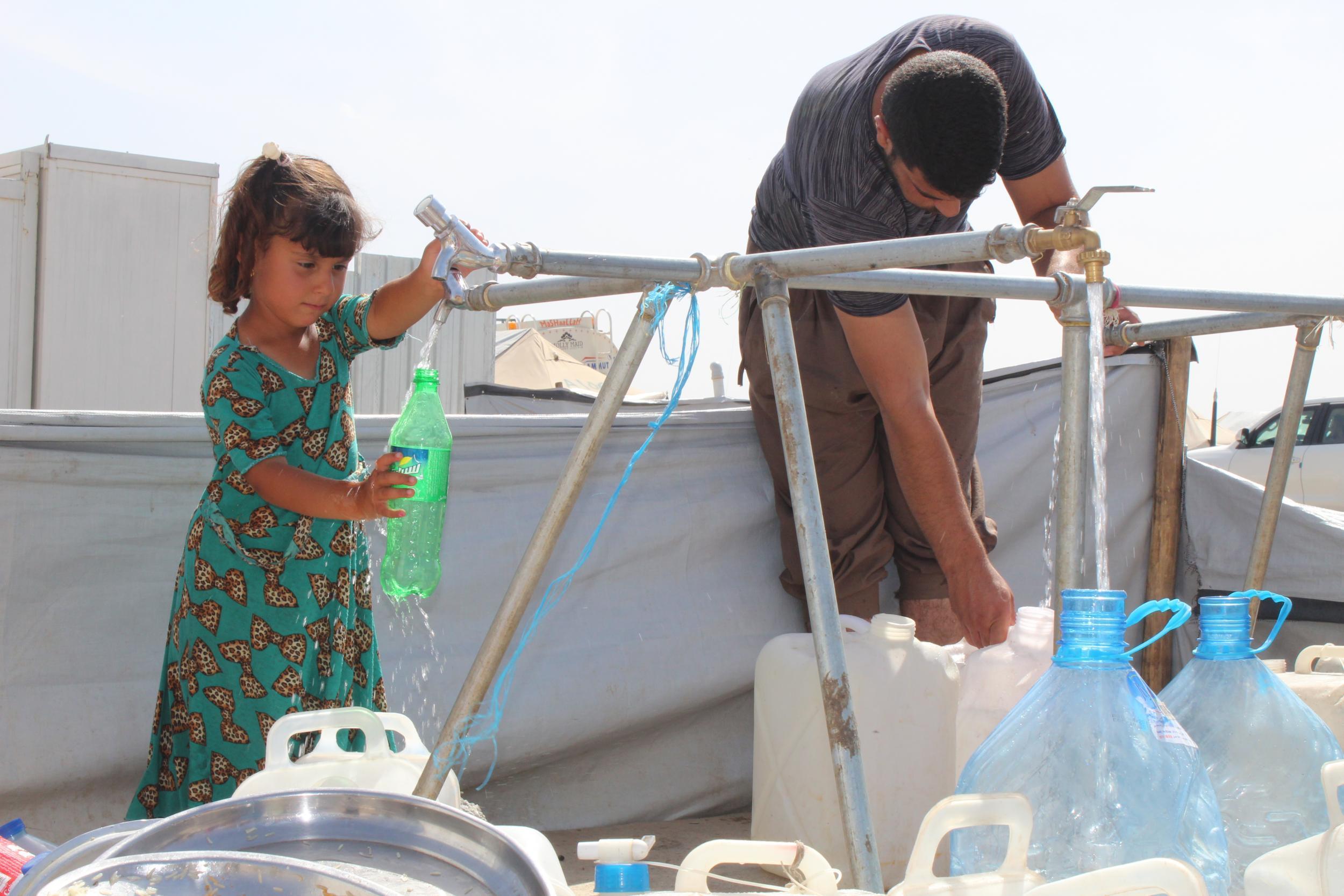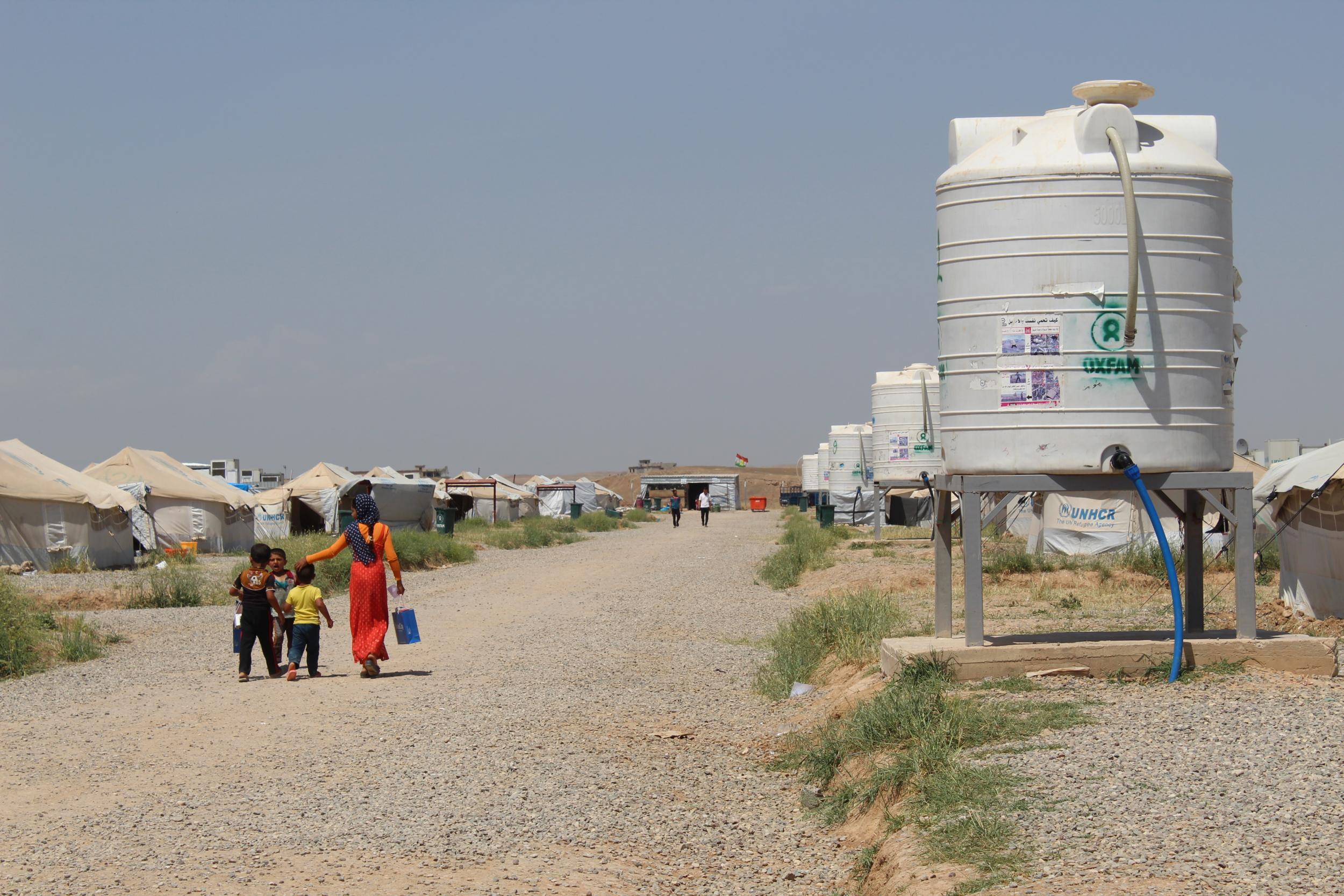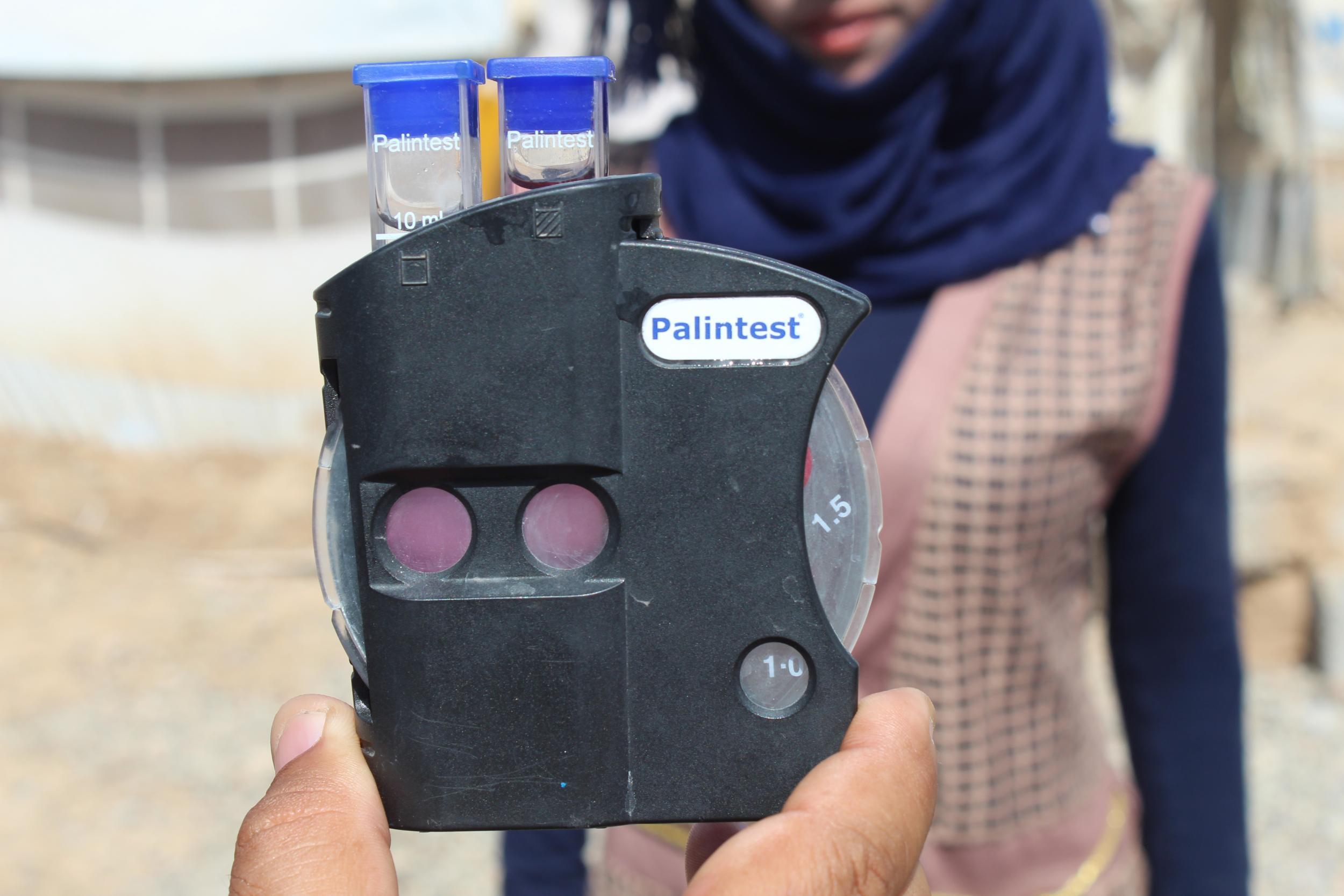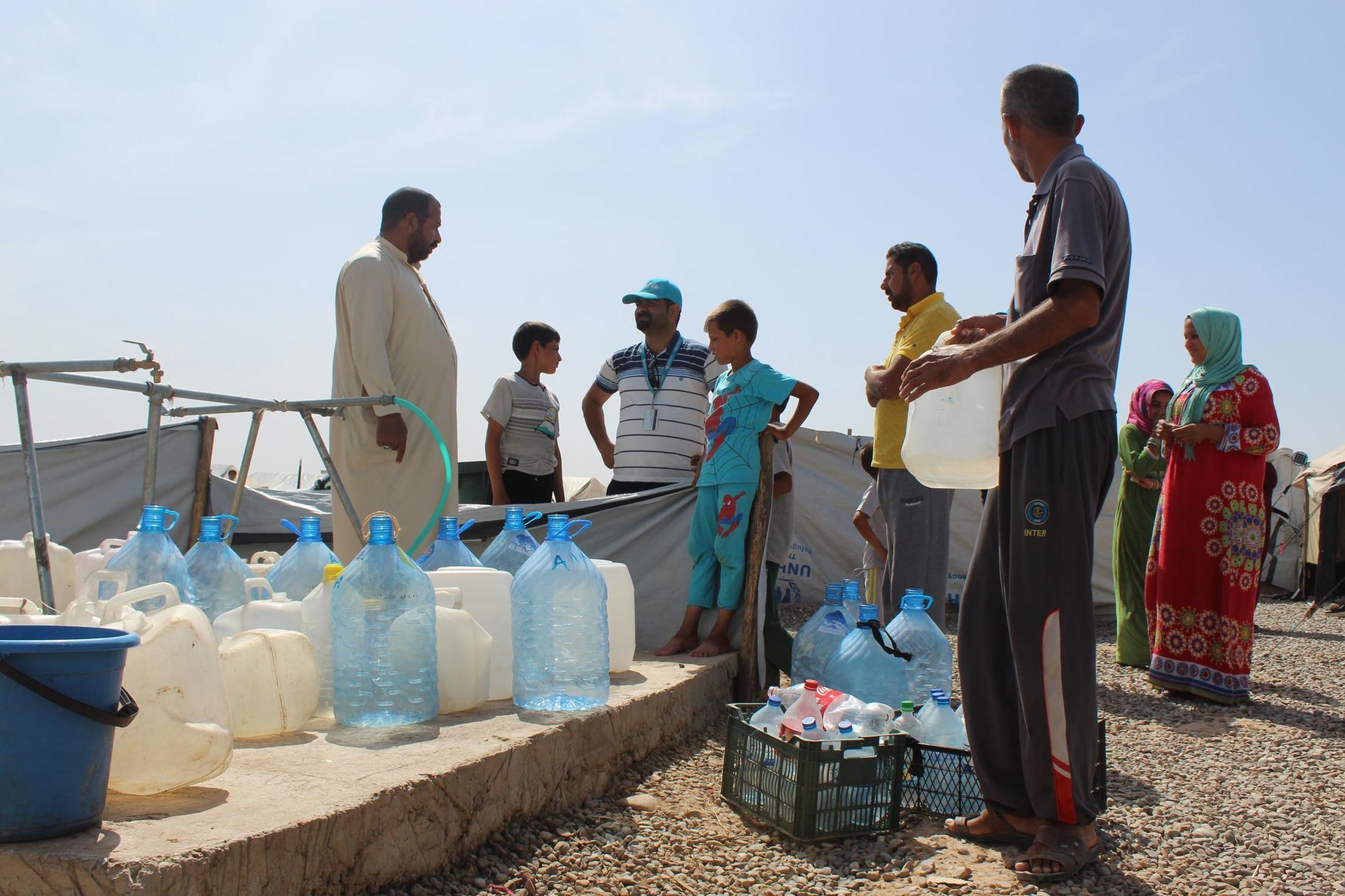Iraqis fleeing Isis face dying from lack of water as dry summer season approaches
People escaping the fighting in Mosul brave Isis snipers and road bombs as well as a new threat: the sun

Your support helps us to tell the story
From reproductive rights to climate change to Big Tech, The Independent is on the ground when the story is developing. Whether it's investigating the financials of Elon Musk's pro-Trump PAC or producing our latest documentary, 'The A Word', which shines a light on the American women fighting for reproductive rights, we know how important it is to parse out the facts from the messaging.
At such a critical moment in US history, we need reporters on the ground. Your donation allows us to keep sending journalists to speak to both sides of the story.
The Independent is trusted by Americans across the entire political spectrum. And unlike many other quality news outlets, we choose not to lock Americans out of our reporting and analysis with paywalls. We believe quality journalism should be available to everyone, paid for by those who can afford it.
Your support makes all the difference.At midday in Hasensham internally displaced persons (IDP) camp, just outside Mosul, the pathways between rows of UN branded tents are deserted. A handful of people sit in shade under blankets strung across the ropes anchoring their makeshift homes to the ground; it’s too hot to do much else.
“I’m glad it is safe here, but it’s so boring, and it’s so hot,” 12-year-old Yusof says. “We don’t even have a fan in our tent. Sleeping is hard and it’s going to get hotter.”
It’s only mid May and the temperature is already hitting 37C. Roads, which a month ago were muddy from spring rain, now leave dust on shoes and clothing, and the sunlight reflecting off thousands of white tents is blinding even with sunglasses.

Last July, Basra in southern Iraq broke records when at 54C it became the hottest place on earth outside Death Valley. The mostly Kurdish north of the country didn’t fare much better when the mercury reached 49C.
While searing heat is a part of every Middle Eastern summer, the abnormally high temperatures led the Baghdad government to declare a mandatory four-day holiday to help people cope.
That was back before the US-backed Operation Inherent Resolve to retake the city of Mosul from Isis began.
Iraqi coalition forces announced the campaign to liberate Mosul’s estimated 1.5 million citizens from more than two years of Isis’ brutality in October 2016, an operation both the Iraqi and US military confidently predicted would be over by the end of the year.
Seven months later, after a gruelling street-by-street battle which has seen heavy civilian casualties, more than 620,000 people have been displaced by fighting in total, and the battle for Mosul’s city centre still rages.
While many people have been able to return home, around 480,000 are currently living in UN or Kurdish Regional Government (KRG) run camps, and more arrivals keep coming: 11,000 have fled south to Haman al-Alil in the last week, and up to 450,000 people are thought to still be trapped or unwilling to leave homes behind the front line.
Luckier civilians are bussed to IDP settlements by the army, but many new arrivals reach their destinations after walking for hours, dodging Isis IEDs (improvised explosive devices), sniper and mortar fire – a journey which will become even more dangerous under the scorching summer sun.
The campaign was not supposed to last this long. While the UN and non-governmental organisations (NGOs) have prepared contingency plans for new arrivals, building several annexes so existing temporary settlements can cope with demand, but now the weather is getting hotter they face new challenges.
Some older camps have housed IDPs since Isis swept across almost one third of Iraq in the summer of 2014, and at this point have installed power lines and semi permanent breezeblock housing. While still basic, the set up allows families to use fans inside – or at least rely on the cool concrete to bring indoor temperatures down to a bearable level.

At Hasensham, conditions are more rudimentary, and while Unicef dug three boreholes near the local river before escaping civilians began arriving last autumn, more are going to be needed soon.
Water from the boreholes is chlorinated and distributed at tanks around the site several times a day – a process known as “water trucking”.
Currently, teams budget for an average of 10 litres of drinking water per person per day – but Chopy, Unicef’s Wash (water, sanitation and hygiene) programme facilitator at the camp, said that 15 litres will be needed before summer.
“We have three boreholes currently, and we are drilling another – it’s a race but we hope to be ready,” he said. “A lot depends on whether we get a big new influx of people, but it’s impossible to know at this stage.”
Ramadan, the month-long Muslim celebration in which adults are not supposed to eat or drink during daylight hours, begins 26 May – and also poses a problem, Chopy said. “We can move food deliveries and the water trucking to the night, that’s not a problem. It’s more the complications that might arise from dehydration.”
Inside Mosul itself, in areas to the east of the Tigris River, which were the first to see families move back into their homes, creating routes to truck safe drinking water into liberated neighbourhoods was the first measure humanitarian agencies put in place. Yet as the weather grows warmer the current supplies will not meet demand, said Melany Markham, media coordinator for the Norwegian Refugee Council (NRC) in Iraq.
“People from Mosul are so resilient, it’s incredible,” she said. “Families who have gone home to the east of the city have been trying to be self reliant, digging their own wells, in some cases. But it’s not safe. The water is not clean, it’s sulphurous.”
NRC and the United Nations Development Programme (UNDP) have this week been trying to get a damaged water sanitation plant in West Mosul up and running again, but progress is often stalled by the precarious security situation. Work on all 25 damaged plants is not expected to be completed for three months.

In the Karaj al-Shamal neighbourhood, Reuters reports that residents tired of waiting for the state or charities to get their water supply back online pooled their resources to repair the mains water pipe themselves – only to see it destroyed again in a coalition air strike the same day it was finished.
“During a visit to the West Mosul plant there was a dead body floating down the river from which people are supposed to get drinking water from,” Ms Markham said.
“If that doesn’t show quite how extraordinarily difficult the situation here is, I don’t know what does.”
To read more about Unicef’s work in Iraq and donate to the emergency appeal click here.
Join our commenting forum
Join thought-provoking conversations, follow other Independent readers and see their replies
Comments